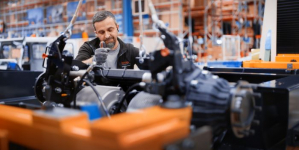-
Rite-Hite unveils new range of hydraulic kits to upgrade and extend dock leveller performance - 1 day ago
-
REWE and Cimcorp automate fresh supply chain for Berlin supermarkets and stores - 1 day ago
-
Q1 – A recovery period or time to fix, switch and scale? - 1 day ago
-
NULOGY’S SHOP FLOOR SOFTWARE TO POWER COMPLETE CO-PACKING’SOPERATIONS - February 13, 2026
-
Why lead generation depends upon good content - February 13, 2026
-
Wallapop and Albatross Sign Strategic Partnership to Bring Real-Time AI Discovery to the Future of Consumer-to-Consumer Commerce - February 12, 2026
-
Thorworld ramp helps Hubergroup to streamline its unloading operation - February 6, 2026
-
TRACKER INNOVATION FROM QUECLINK TO BOOST STOLEN VEHICLE RECOVERY PERFORMANCE - February 4, 2026
-
Flexi Narrow Aisle hits 50! - January 29, 2026
-
DERRY BROS ATTRACTS RECORD NUMBERS OF FREIGHT CUSTOMERS SEEKING CUSTOMS SUPPORT - January 29, 2026
Get Cracking on Your Racking Protection.
How the perils of unsafe racking can be catastrophic for business
In 2016 there was a racking collapse at a cheese factory in Shropshire. So devastating were the results
that it made the national news, with some tabloids making merry on cheese-based puns.
Although the forklift driver responsible for the collapse escaped unhurt, for the company involved,
and for anyone involved in facility protection, the racking collapse was no laughing matter.
Once a company suffering such a disaster overcomes the potentially crippling costs of restoring order,
replacing damaged equipment and handling lost or unfulfilled orders, the next phase can be even
more costly and stressful for employers.
The Health and Safety Executive would need long access to compile a thorough report, resulting in
more downtime – followed potentially by fines if unsafe procedures were found to be in place.
Any injured staff would need to be replaced and trained, with compensation claims a real possibility.
Future insurance would most likely go through the roof. And what about the company’s credibility?
Who would do business with a company that’s on the national news as a confirmed disaster area?
All of which means one thing: protect your racking.
Most good companies will already have rack inspections in place – and good training and certification
for FLT drivers is naturally essential. But there is a type of damage that is harder to detect than a dent
from a rogue driver.
All racking will have problem areas, where even the most capable of FLT drivers are tested. Grazes,
brushes – even taps from hand-held pallets – all contribute to the gradual and persistent weakening
of rack strength.
Often the problem areas are at turning corners where vehicle manoeuvrability is compromised – and
sometimes even the most conscientious of drivers might not realise when there has been a slight
knock on a racking leg.
Over time, as these knocks add up, so rack strength gradually deteriorates – and the likelihood of a
rack collapse increases.
Fitting upright protectors on rack legs should, by now, be common practice for warehouse managers.
McCue have two industry-leading versions – an easy-to-install wraparound that straps directly onto
racking and a heavy duty floor-mounted option with a shock-absorbing rubber core.
And for those troublesome turning corners, McCue have it covered too. The Rack End Protector has
55 pounds of high tensile steel fastened to the concrete with steel anchors. It deflects any impact
forces away from the racking.
So protect all of your racking now and prevent rack collapse in the future – and in the process you’ll
make sure your company won’t become the disaster headline of tomorrow.
Contact McCue about rack inspections on 01908 365511, or view their range of rack protection
solutions at www.mccue.com/uk.

































